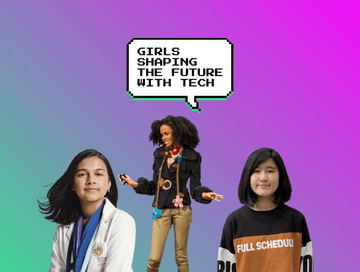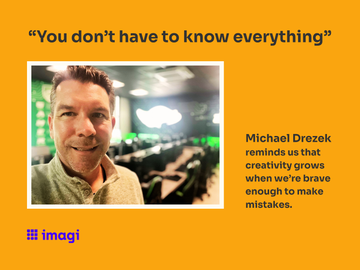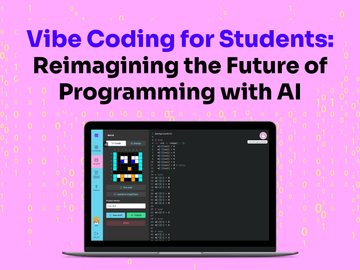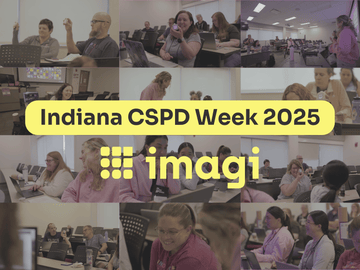
March is a time to celebrate women and girls, and imagi is doing that by highlighting the remarkable achievements of young women using technology and computer science (CS) to tackle global challenges. In honor of Women’s History Month, let’s explore how Gitanjali Rao, Maya Penn, and Emma Yang are leveraging tech for social good.
Gitanjali Rao: Innovating for Kindness with ‘Kindly’

I don’t look like your typical scientist. Everything I see on TV is that it’s an older, usually white man as a scientist. It’s weird to me that it was almost like people had assigned roles, regarding like their gender, their age, the color of their skin. My goal has really shifted not only from creating my own devices to solve the world’s problems, but inspiring others to do the same as well. Because, from personal experience, it’s not easy when you don’t see anyone else like you. So I really want to put out that message: If I can do it, you can do it, and anyone can do it.
At just 15 years old, Gitanjali Rao was named TIME’s First-Ever Kid of the Year in 2020 for her incredible innovations, including Kindly, which started as an app and has now become an add-on extension on social media platforms and online tools, like Instagram and Google Chrome.
Moving around and always changing schools meant Gitanjali constantly had to be the ‘new kid’ and as a result faced bullying. She realized how significant the issue of bullying was among teens, specifically cyberbullying in the age of social media, so she sought to create a solution. That’s when she came up with Kindly.
Kindly aims to tackle cyberbullying and uses AI technology to detect and flag cyberbullying language, helping to protect kids and teens from harmful online interactions. By analyzing words and identifying similar harmful phrases, it allows users to manage their online presence and messaging more safely. Gitanjali’s vision for Kindly is being recognized globally, with UNICEF currently developing her software as a digital public good, technology accessible to anyone and designed solely to make the world a better place.
“There’s an opportunity to take something like this [Kindly] to scale, it’s really unique for someone to understand the challenges of teenagers, but also have the technical ability to connect those two and use an AI solution to deal with something so meaningful.” Michele Walsh (Chief Philanthropy Officer, UNICEF)
Additionally, Gitanjali’s message is clear that technology and kindness can go hand in hand, and she’s on a mission to inspire others to use their skills to create positive change. She is currently a Sophomore at MIT, studying Bioengineering and Business Management. You can read more about Gitanjali’s journey here:
Maya Penn: Coding for a more Greener and Sustainable Tomorrow with “Maya’s Ideas”

I think all girls should have that experience, if you want to learn to code, if you want to learn to build or engineer, it shouldn’t be held away from you.
Maya Penn’s journey as a young coder and environmental activist began at the age of 8, when she taught herself HTML and created her first website, Maya’s Ideas. What started as a small eco-friendly fashion business has now grown into a powerful platform and company for sustainable products as well as environmental education. Maya's passion for sustainability, specifically sustainable fashion, is evident in her work, as she continues to combine her computational thinking skills, entrepreneurship, and environmental activism to make a difference in the world.
Her company promotes eco-friendly and sustainable living, offering products and educational content that empower others to make more responsible as well as environmentally-conscious choices. At 23, Maya has grown her company into a sustainable fashion brand, and is now a sought-after sustainable consultant, where she consults with Fortune 500 companies and start-ups on their Environment, Social and Governance (ESG) and Corporate Social Responsibility (CSR) goals and initiatives.
You can learn more about Maya’s mission and her work with Maya’s Ideas here:
Emma Yang: Empathy and Innovation in Healthcare with “Timeless”

I was amazed at the extraordinary range of things you could create with code, it didn’t matter whether it was a game, tool or any other application. Whether it was simple or complex, it was my own personal creation that I could share that was special and unique that I could share with the rest of the world.
Emma’s journey into coding began at the age of 6, when her father introduced her to Scratch. From there, her passion for technology grew, and she began to develop apps like Concussion Checker, which helps assess head injuries. But it was Timeless that truly highlighted Emma’s dedication to solving real-world problems through coding.
After witnessing her grandmother struggle with Alzheimer’s disease, Emma, at just 13 years old, used her coding skills to create Timeless, an app designed to help Alzheimer’s patients stay connected with their loved ones. Timeless uses AI-based facial recognition technology to help patients recognize family members and friends, improving their ability to connect and retain memories.
Emma’s work has earned her recognition as one of New York’s 10 Under 20 Young Innovators to Watch. Furthermore, Emma’s Timeless app has won her numerous awards such as the 2017 MIT Solve Brain Health Challenge, the 2018 Women Startup Challenge Grand Prize (out of 300 women-led startups in the US), and the 2020 SupChina NextGen Female Rising Star Award.
Emma has since taken Timeless off the App Store after 8 successful years. Nevertheless, she still remains a strong advocate for encouraging young girls to explore their passion for STEM and technology. Emma is currently a senior and in her last semester at Harvard University, where she is majoring in CS and Physics. You can learn more about Emma’s journey here:
imagi: Inspiring the Next Generation of Girls and Women in STEM

The stories of Gitanjali Rao, Maya Penn, and Emma Yang highlight the powerful impact these young women are making in tech, using their skills to tackle issues like cyberbullying, sustainability, and healthcare.
At imagi, we are proud to be a female-founded EdTech startup dedicated to empowering the next generation of STEM innovators. We strive to inspire young girls to explore CS and computational thinking, believing that every girl deserves the chance to create with STEM. With tools like our imagi app, charms, and curriculum, we help young learners worldwide, including young girls, build confidence in their CS and computational skills, and potentially solve real-world problems with STEM. As we celebrate Women’s History Month, let’s draw inspiration from these young female innovators and leaders, and continue to encourage all girls and women to explore the limitless possibilities within STEM.




